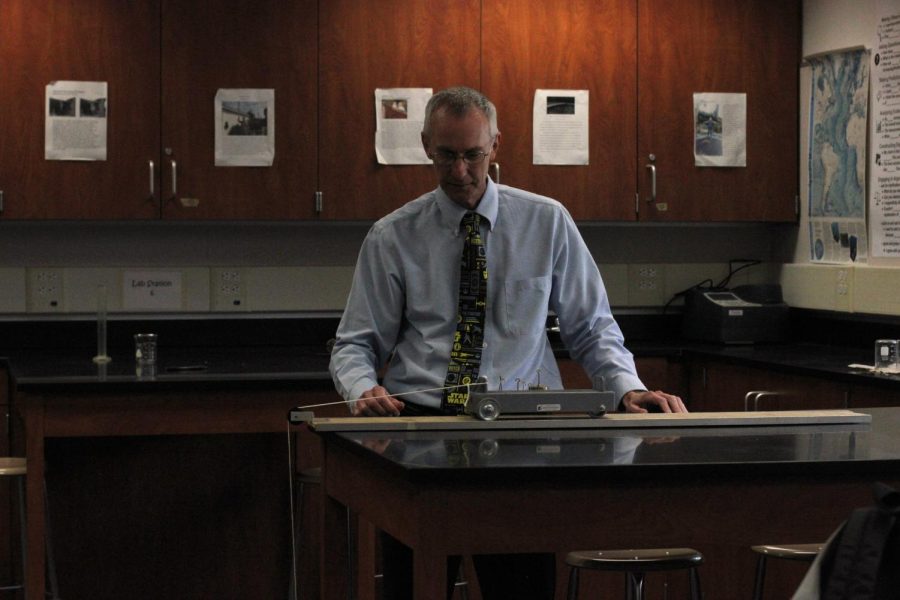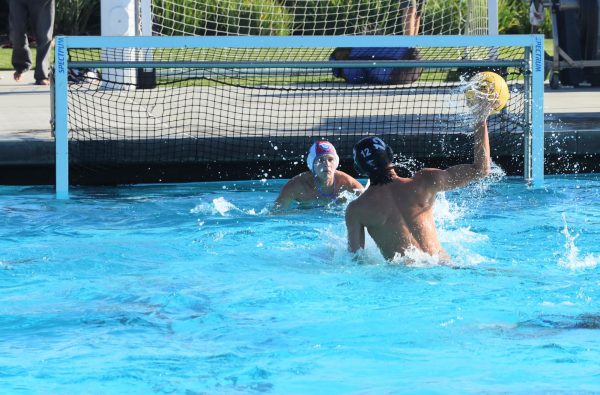A guide to Advanced Placement Physics
AP Physics teacher Mr. Weldele brings out weights and a small car to create a demonstration for his physics students.
May 11, 2022
This article is a continuation of the Advanced Placement series that describes what to expect when diving into each college level course at Foothill Technology High School (Foothill Tech). If you are curious and want to explore what AP Physics has to offer, then this article is for you.
Taught by Mr. John Weldele, a teacher well known for his flamboyant assortment of neck ties, extremely kind nature and devotion to the Foothill Tech science department, AP Physics is the perfect class for people who love math and science or are determined to put in hard work to find success in physics.
Weldeles’ class examines how occurrences such as walking and playing catch with a baseball are scientifically possible. When asked about what is learned in AP Physics, Weldele states, “We deal with a lot of motion… Things like forces, momentum, and energy and how they interact, and what happens to an object because it has these quantities.” According to Weldele, some common questions addressed in the class range from “How is an object moving?”, “Why is an object moving?” and “What are the ramifications of motion?”
To help develop a better understanding of the concepts explored, labs are a large element of the class. So if you’re looking for an interactive class, AP Physics may be a perfect fit. “[Labs are] a large component of any science, physics included,” shares Weldele. He states that labs are a vital part of science because students are “able to take what we are learning, try to manipulate it and see how it actually works.”
Not only do students get to partake in experiments, but they also get experience of creating their own labs. “One of the focuses of AP Physics is that students are going to be able to design their lab and figure out what they need to measure and how they need to make measurements in order to accomplish the tasks,” expresses Weldele.
If you are wondering what classes you should take to prepare for AP Physics, honors chemistry and honors math courses are the ideal pathway to reaching this college level class. It will benefit you to have a sophisticated understanding of mathematics, as advanced calculations and computations are needed to solve complicated problems in physics, especially when diving into experiments.
For many students, homework can be the most overwhelming component of school. If you are curious about how much homework this class entails, Weldele remarks that he tries to make the homework last around half an hour a night, which is a lesser homework load than many classes on campus. The homework that is given helps students prepare for tests. Sofie Prieto ’22 states, “He gives us lots of review work and stuff like that. Especially for the AP tests, it’s very important. All of the tests we have taken are very very similar to the homework that Mr. Weldele gives us.”
Prieto also remarks, “you have to think a lot more about it than some other classes.” That said, the challenging aspect of the class can lead to an end reward as Prieto notes that “getting a problem right is so satisfying!” Perseverance through hard concepts can sometimes be the greatest reward.
Not only does this class have an abundance of math and science incorporated into its curriculum, as students also get to perform experiments that will help develop an understanding of the important concepts they are learning in class. If you are interested in a course that introduces advanced math and science concepts, AP Physics is a perfect fit for you.















